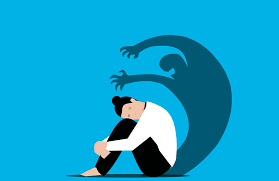 This past fall nearly broke Lauren Directo. Her anxiety and depression worsened during her senior year due to complications within her social circle, overwhelming online classes and the uncertainty of life after graduation.
This past fall nearly broke Lauren Directo. Her anxiety and depression worsened during her senior year due to complications within her social circle, overwhelming online classes and the uncertainty of life after graduation.
Counseling at the Office of Counseling and Wellness was the only way Directo could receive free aid without her parents knowing, as mental health is stigmatized within her family. She poured her soul out during her intake session via Zoom hoping she would receive relief, only to be referred out with a list of mental health resources at her second teletherapy session. She was told she would benefit from long-term help rather than short-term therapy.
“I went for therapy. I didn’t go for resources, like I could’ve just done that myself,” said Directo. “Like I completely get it but it’s like, why offer therapy in the first place?”
In October 2020, The City University of New York received $5 million from the federal CARES Act to increase the amount of clinical staff and prepare for teletherapy. The $278,000 that was allocated to Hunter College was used solely to fund telehealth according to Jennifer Gaboury, a lecturer and adviser in women and gender studies as well as the chair of Hunter’s Professional Staff Congress chapter.
“They didn’t want to commit to bringing on more permanent positions with funding streams that weren’t permanent,” said Gaboury.
According to the International Accreditation of Counseling Services, the ratio of mental health counselors to students should be 1:1,000. The CUNY Rising Alliance reported in January that the ratio for CUNY colleges is about 1:2,700. There are seven counselors and one intake coordinator listed on the office’s official website.
One senior psychology major and an e-board member of Hunter’s Psychology Collective recalled feeling invalidated when he was referred out by a clinical intern who said his symptoms were too serious for the office upon his intake session in May 2020.
“She asked a follow-up question which I found to be insensitive and triggering,” said the student, who asked to be identified as “Will Varney” due to concerns of publicizing his mental health history. “It’s kind of unacceptable for the people on the front lines to be insensitive especially when a student is taking steps to spell out what his problem is.”
Varney sought help outside the list of clinical resources provided to him as he found that some of the clinics listed were either not operating or taking in new patients.
“If you are in the thick of a depressive episode you’re gonna find it really tough to sort through all of that,” said Varney.
The Office of Counseling and Wellness hadn’t responded to interview requests from The Athenian at the time of publication.
The diversity of the staff is also a concern for students as racial matching in therapy increases cultural sensitivity. Directo said she felt uncomfortable talking to a white woman about being disciplined while growing up Asian when she was asked about child abuse during her intake session.
“As Asian Americans we were definitely disciplined in a very different way, and I guess it raised eyebrows and at some point throughout the intake she had to discuss it with her colleague,” said Directo. “They ended up not doing anything since it was a long time ago. I get what they’re doing, but I felt conflicted since I know it’s not the right way (to be disciplined) but we were preconditioned to be raised that way.”
CUNY Rising Alliance estimates that $78,943,000 will be needed to expand the capacity of CUNY’s mental health staff by 171 new counselors and 372 academic advisors.
Jennifer Martinez, a clinical psychology major and moderator for Hunter’s chapter of the Unmasked Project mental health app, said the short-term counseling provided is “realistic” given the number of students and the complexities of each student’s mental health status.
“I think it’s good they don’t promise something that can’t be delivered so I appreciate its function as it is,” said Martinez.
After 11 sessions with the behavioral therapist Directo found through her workplace, she realized she wasn’t having a good counseling experience. Directo is currently looking for affordable therapy once more.

